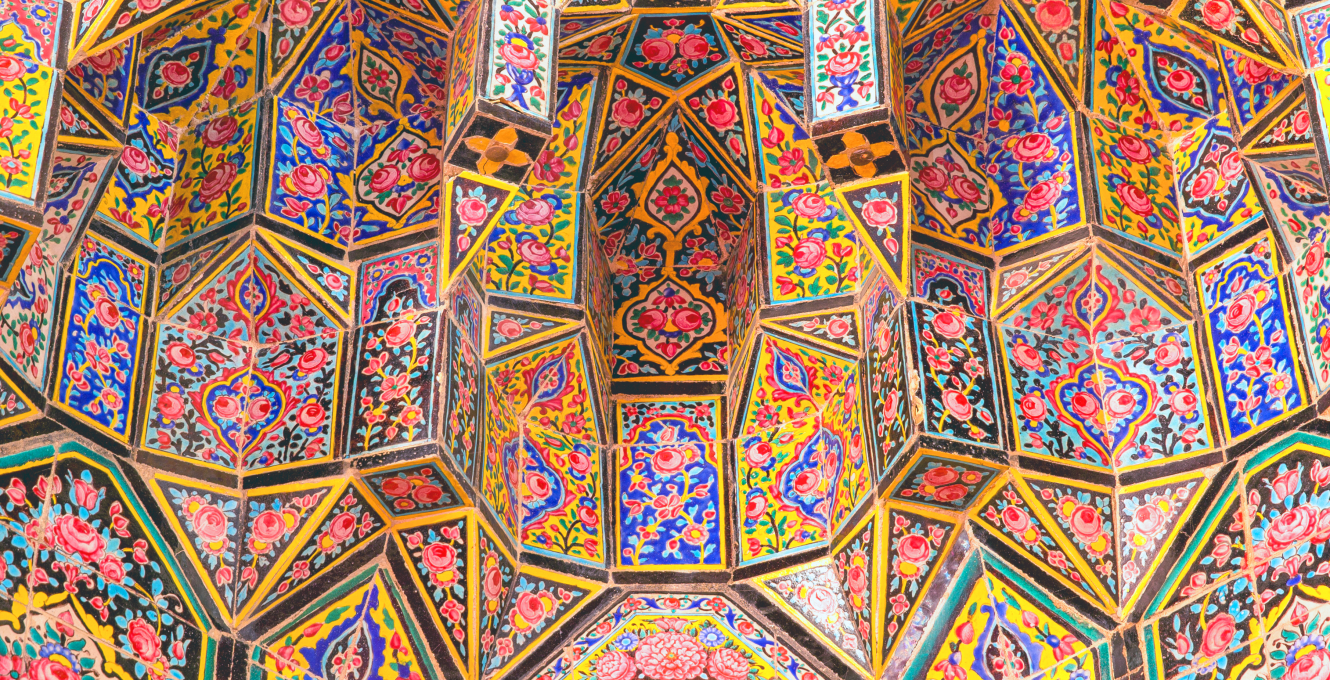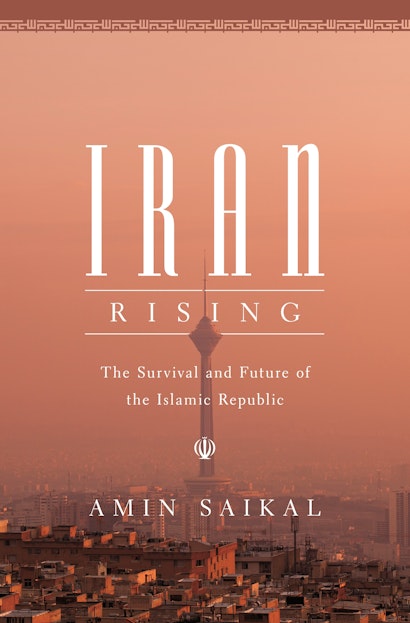When Iranians overthrew their monarchy, rejecting a pro-Western shah in favor of an Islamic regime, many observers predicted that revolutionary turmoil would paralyze the country for decades to come. Yet forty years after the 1978–79 revolution, Iran has emerged as a critical player in the Middle East and the wider world, as demonstrated in part by the 2015 international nuclear agreement. In Iran Rising, renowned Iran specialist Amin Saikal describes how the country has managed to survive despite ongoing domestic struggles, Western sanctions, and countless other serious challenges.
What did international observers predict would happen in Iran after the 1978-79 revolution? Why did things turn out differently?
AS: The Iranian revolution marked a momentous development in world politics, challenging the regional order and America’s dominant position in the Middle East. A new Islamic Republic of Iran, under the theo-political leadership of Ayatollah Ruhollah Khomeini, replaced the Shah’s pro-Western monarchy. It condemned the US for supporting the Shah’s autocratic rule and disparaged America’s regional allies, including Israel. It locked horns with Washington—something that has continued to date, though in different intensity from time to time. Khomeini established a unique Shia-based system of Islamic governance. In a bloody power struggle following the overthrow of the Shah, Khomeini swiftly and forcefully eliminated or marginalised groups and individuals who had actively participated in the revolution, but did not agree with his brand of Islamism. The resultant post-revolutionary turmoil, and the Islamic regime’s unorthodox theocratic behaviour on both domestic and foreign policy fronts, led some analysts to conclude that the regime was an aberration and could not possibly endure. However, the regime has now lasted for forty years, surviving numerous domestic and foreign policy challenges. Three key variables account for this. First, the internal elasticity and external flexibility of the regime’s system of governance enable it to both claim religious legitimacy and act pragmatically to survive. Over time, it has become less ideological and more pragmatic. Second, changing conditions within Iran and internationally have enabled the regime and its supporters to take advantage of American policy failures in the region—including, most importantly, in Iraq, Afghanistan, Syria, and on the Israeli-Palestinian front—to expand its regional influence. Third, it has built up hard and soft power capability in support of an asymmetrical defensive strategy.
How has Iran’s Islamic regime weathered the international sanctions against it?
AS: The Islamic regime has been under American sanctions since the “hostage crisis.” On 4 November 1979, a group of militant student supporters of Khomeini overran the US embassy in Tehran and took 52 of the embassy’s diplomatic and non-diplomatic personnel hostage. The episode lasted until President Ronald Reagan’s inauguration on 20 January 1981. The Islamic regime used the crisis to consolidate power, humiliate the United States, and pierce Pax Americana in the Middle East. Washington severed all ties and imposed sanctions on Iran. The regime coped with this— along a bloody, and costly war with Iraqi dictator Saddam Hussein—by extracting more from the Iranian people and by pragmatically strengthening ties with the Soviet Union (and subsequently its successor, Russia) and China, despite the regime’s serious aversion to godless communism. It also entered closer cooperation with India. It engaged in processes of self-sufficiency and took steps to circumvent the sanctions. When the UN later imposed sanctions, and the US and its European allies ratcheted up their sanctions over Iran’s nuclear program, the regime pursued the same approach. It is now forced to act in a similar fashion once again, to counter President Donald Trump’s efforts to tame the regime in line with American interests. Trump’s sanctions imposed following his withdrawal in May 2018 from the July 2015 multilateral nuclear agreement known as the Joint Comprehensive Plan of Action (JCPOA) are indeed very severe. Targeting the core elements of the Iranian economy, they are designed to strangle the regime economically and force it to change behaviour that Trump has branded as destructive and destabilising in the region—and therefore contrary to America’s interests. Trump’s actions will seriously hurt Iran’s already fragile economy, causing more hardship for ordinary Iranians. But they are unlikely to affect the regime to the point of submission, given its theocratic nature and the Iranian people’s tradition of fierce nationalism in the face of an outside threat or assault. After all, it was not the US-led international sanctions—imposed on Iraq following the February 1991 US-led liberation of Kuwait from Iraqi occupation—that ended Saddam Hussein’s rule, but rather the March 2003 US invasion of Iraq.
How would domestic policy changes lead to foreign policy changes?
AS: A majority of the Iranian people are crying out for improved living standards. Economic mismanagement, rampant corruption, international sanctions, and the residual effects of war with Iraq have led to high unemployment, inflation, and declining living conditions. As public pressure has built, the clerical leadership has responded by allowing occasional economic and social reforms. At the same time, it has been able to blame the US and its allies for Iran’s economic woes and keep most Iranians on their toes in a conflated Shia and nationalistic posture. President Trump’s blatant support for public protests—primarily over the economic situation, and also the clerical domination of power—has conveniently enabled the regime to attribute Iran’s problems to America’s hegemonic and imperialist designs on the Iranian people. As the regime has defied the US, it has sought good relations with countries that have not shared Trump’s hostile attitude. These include, prominently, the other signatories to the JCPOA (Britain, France, Germany, Russia and China), which have remained committed to the nuclear agreement, with a promise to override America’s ban on third party’s business dealings with Iran.
Can the history of the Islamic Republic help us understand Islamic governments in other countries?
AS: Not necessarily. Iran’s system is heavily informed by Khomeini’s Shia version of Islam and is linked to Iran’s peculiar traditions. Neither the three other Shia-majority countries (Iraq, Azerbaijan and Bahrain) nor any of the Sunni-majority states, whose citizens form the bulk of the world’s 1.7 billion Muslims, have emulated Iran’s system of governance. For a combination of sectarian and geopolitical reasons, only Bashar al-Assad’s Syrian regime and some Shia sub-national groups, such as Hezbollah in Lebanon and the Houthis in Yemen—not to mention certain Iraqi Shia militias—have sought close relationships with Tehran.
What about US-Iran relations?
AS: The United States has tried everything short of direct military confrontation to contain the Iranian Islamic regime since its advent—and so far has failed. President Trump has promised that his latest round of sanctions will debase the regime economically and politically. But the likelihood of this happening seems remote. Realising this, President Obama pursued a policy of engagement rather than confrontation toward the regime. This led to the JCPOA, a landmark diplomatic achievement and a shot in the arm of the reformist and pragmatic factions in Iranian politics, led by President Hassan Rouhani, to strengthen their position in the power structure. Trump’s actions have once again energised the hardline clerics and their supporters, associated with the Supreme Leader Ayatollah Ali Khamenei, to maintain their centrality in governing Iran and beef up their stance against any form of rapprochement with the United States or reformation of the Iranian system. The main question is: If his present measures fail and his own presidency survives, given the magnitude of his domestic problems, will Trump move toward military confrontation? War would be disastrous for all sides, as Iran has invested heavily in an asymmetrical fighting strategy to make an attack on it as costly as possible for its perpetrator.
Amin Saikal is Distinguished Professor of Political Science, Public Policy Fellow, and Director of the Centre for Arab and Islamic Studies (the Middle East and Central Asia) at the Australian National University. He is the author of The Rise and Fall of the Shah (Princeton) and Modern Afghanistan. He lives in Canberra.

